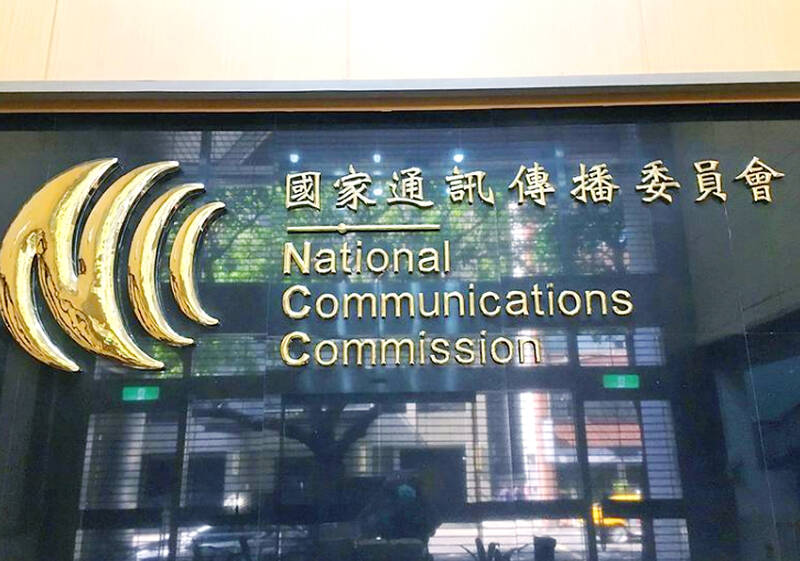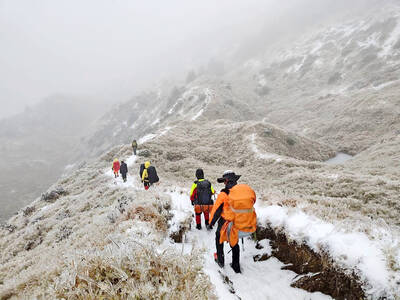EMAG Technology could face a maximum fine of NT$1.2 million (US$39,056) for illegally importing an uncertified gaming smartphone into Taiwan, the National Communications Commission (NCC) said yesterday.
EMAG Technology, also known as MiClub, in March launched a fundraising plan on FlyingV — a Taipei-based fundraising platform — to import the RedMagic 8 Pro into the country.
A total of 1,022 people participated in the plan, which had accumulated more than NT$23 million.

Photo: Yang Mien-chieh, Taipei Times
The scheme last month came to the attention of the smartphone regulator after some gamers complained to local news media that they had yet to receive their orders.
Although some people received smartphones last week, they soon discovered that the smartphone would display the location as “Taiwan, China,” when a call was made or received.
The RedMagic 8 Pro has yet to be certified and verified as a safe radio frequency device, the commission yesterday said in a statement, adding that it would issue penalties according to the Telecommunications Management Act (電信管理法) after collecting evidence.
EMAG Technology could face a fine of up to NT$1 million for importing the gaming smartphone without securing approval from the NCC, the commission said.
It could face an additional fine of NT$200,000 for selling an uncertified and unverified smartphone, it added.
The fine would be finalized at the NCC commissioners’ meeting, it said.
NCC specialist Wang Chih-yuan (王智遠) told the Taipei Times that people can bring radio frequency devices into the country for personal use, but there is a limited number allowed per person and the device must have already been certified and verified by the NCC.
“From what we have seen so far, MiClub appeared to accept the funds from different individuals, import devices from overseas on their behalf and distribute devices to individuals who participated in the fundraising plan. In that case, they need to secure a permit for import first,” he said.
The NCC has yet to receive requests for certification and verification for the RedMagic 8 Pro from EMAG or other parties, he said.
Meanwhile, FlyingV is to be asked to take down any fundraising plan involving the sale of uncertified radio frequency devices, he said.
Should the RedMagic 8 Pro pass the certification and verification tests, the manufacturer or the agent would be asked to address the problem that the smartphone displays Taiwan as part of China, which is detrimental to national dignity, Wang said.
“Should the situation persist, we could abolish the certificate issued to them and ban the smartphone from being sold in Taiwan, as per the Regulations Governing Compliance Approval for Controlled Telecommunications Radio-Frequency Devices (電信管制射頻器材審驗管理辦法),” Wang said.
Using smartphones that are not certified by the NCC could affect the safety of other electronic appliances, disrupt radio waves, and generate concerns for personal data and cybersecurity breaches, the commission said, adding that consumers should ensure that the smartphones they purchase have been certified by the NCC.
The commission said it would coordinate with the Consumer Protection Committee and the Ministry of Digital Affairs to handle consumer disputes generated by the fundraising plans.
In 2019, Chinese smartphone manufacturer Huawei Inc was asked to stop sales of its P30, P30 Pro and Nova 5T smartphones in Taiwan after a system update led them to refer to the nation as “Taiwan, China,” rather than “Taiwan,” in the caller’s location and warranty areas.

Trips for more than 100,000 international and domestic air travelers could be disrupted as China launches a military exercise around Taiwan today, Taiwan’s Civil Aviation Administration (CAA) said yesterday. The exercise could affect nearly 900 flights scheduled to enter the Taipei Flight Information Region (FIR) during the exercise window, it added. A notice issued by the Chinese Civil Aviation Administration showed there would be seven temporary zones around the Taiwan Strait which would be used for live-fire exercises, lasting from 8am to 6pm today. All aircraft are prohibited from entering during exercise, it says. Taipei FIR has 14 international air routes and

The Ministry of National Defense (MND) today released images of the military tracking China’s People's Liberation Army (PLA) movements during the latest round of Chinese drills around Taiwan. The PLA began "Justice Mission 2025" drills today, carrying out live-fire drills, simulated strikes on land and maritime targets, and exercises to blockade the nation's main ports. The exercises are to continue tomorrow, with the PLA announcing sea and air space restrictions for five zones around Taiwan for 10 hours starting from 8:30am. The ministry today released images showing a Chinese J-16 fighter jet tracked by a F-16V Block 20 jet and the

Snow fell on Yushan (Jade Mountain, 玉山) yesterday morning as a continental cold air mass sent temperatures below freezing on Taiwan’s tallest peak, the Central Weather Administration (CWA) said. Snowflakes were seen on Yushan’s north peak from 6:28am to 6:38am, but they did not fully cover the ground and no accumulation was recorded, the CWA said. As of 7:42am, the lowest temperature recorded across Taiwan was minus-5.5°C at Yushan’s Fengkou observatory and minus-4.7°C at the Yushan observatory, CWA data showed. On Hehuanshan (合歡山) in Nantou County, a low of 1.3°C was recorded at 6:39pm, when ice pellets fell at Songsyue Lodge (松雪樓), a

NO SHAME IN RETREAT: Hikers should consider turning back if the weather turns bad or if they do not have sufficient equipment, the Taroko park headquarters said Two people died of hypothermia over the weekend while hiking on Hsuehshan (雪山), prompting park authorities to remind hikers to bring proper equipment and consider their physical condition before setting out in the cold weather. Temperatures dropped over the weekend, bringing snow to high altitudes in Shei-pa National Park. One hiker, surnamed Lin (林), who on Friday was traveling with a group of six along the Hsuehshan west ridge trail, lost consciousness due to hypothermia and died, the Shei-pa National Park Headquarters said. On Saturday, another hiker, surnamed Tien (田), in a group of five on the southeast of the west